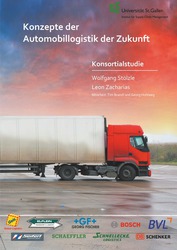| Departments | |
|---|---|
| Book Series (96) |
1381
|
| Nachhaltigkeit |
3
|
| Gesundheitswesen |
1
|
| Humanities |
2370
|
| Medienwissenschaften | 16 |
| Theology | 57 |
| Philosophy | 102 |
| Law | 424 |
| Economics | 851 |
| Social sciences | 418 |
| Sports science | 48 |
| Psychology | 233 |
| Educational science | 190 |
| History | 183 |
| Art | 111 |
| Cultural studies | 166 |
| Literary studies | 117 |
| Linguistics | 88 |
| Natural Sciences |
5408
|
| Engineering |
1795
|
| Common |
98
|
|
Leitlinien Unfallchirurgie
5. Auflage bestellen |
|
Advanced Search
Konzepte der Automobillogistik der Zukunft (English shop)
Konsortialstudie
Wolfgang Stölzle (Author)Leon Zacharias (Author)
Preview
Extract, PDF (280 KB)
Table of Contents, PDF (69 KB)
Die Konsortialstudie «Konzepte der Automobillogistik der Zukunft» untersucht die auf die Automobilindustrie und deren Inbound-Logistik wirkenden Veränderungen und Trends sowie deren Auswirkungen auf die Logistikprozesse und -strukturen. Unter Berücksichtigung dieser Einflussgrössen werden die Logistikkonzepte der Automobilindustrie kritisch geprüft, um darauf aufbauend künftige Logistikkonzepte zu entwickeln. In der Studie wurden Zukunftsszenarien berechnet, diese sind zusammen mit den Veränderungstreibern Grundlage für die Entwicklung von Zukunftsszenarien. Insgesamt wurden neuen Zukunftskonzepte entwickelt (Car Chain Visibility, FutureWOW, OFTO, Pizza Run, Trailer Drive, Urban Future, Green Industry Cluster, FlexJIS, Energy Hubs). Für die Umsetzung der Zukunftskonzepte sind besondere Enabler zu beachten, welche die Wirksamkeit der Konzepte beeinflussen: Fachkräfte aktiv gewinnen und halten, ein modernes und intelligentes Parkplatzmanagement schaffen sowie das Tender-Management anpassen. Damit spannt sich der Faden der automobilen Inbound-Logistikkonzepte von morgen von relevanten Trends als Impulsgeber bis hin zu Enablern für die Umsetzung der Konzepte.
The consortium study “Concepts of Automotive Logistics of the Future” analyzes the changes and trends affecting the automotive industry and its inbound logistics as well as their impact on logistics processes and structures. Taking these influencing factors into consideration, the logistics concepts of the automotive industry are critically examined in order to develop future logistics concepts based on these findings. Future scenarios were calculated in the study; together with the change drivers, these form the basis for the development of future scenarios. In total, nine future concepts were developed (Car Chain Visibility, FutureWOW, OFTO, Pizza Run, Trailer Drive, Urban Future, Green Industry Cluster, FlexJIS, Energy Hubs). For the implementation of the future concepts, special enablers have to be addressed, which influence the effectiveness of the concepts: Actively attract and retain skilled workers, create a modern and intelligent parking management system, and adapt tender management. The automotive inbound logistics concepts of tomorrow thus range from relevant trends as impulse generators to enablers for the implementation of the concepts.
| ISBN-13 (Hard Copy) | 9783736976191 |
| ISBN-13 (eBook) | 9783736966192 |
| Final Book Format | A4 |
| Language | German |
| Page Number | 104 |
| Lamination of Cover | matt |
| Edition | 1. |
| Publication Place | Göttingen |
| Publication Date | 2022-08-05 |
| General Categorization | Non-Fiction |
| Departments |
Economics
Automotive engineering |
| Keywords | Automobilindustrie, Auto, Vernetztes Auto, Zukunftskonzepte, Zukunft des Autos, Innovationen, Supply Chain Management, Inbound-Logistik, Losgrößen, Adaptive Fertigung, Konsortialstudie, Bosch, Schaeffler, Geis, BMW, Mercedes, Tesla, Zukunft, Etablierte Konzepte, Industrieparks, Lager auf Rädern, Bestandskonzepte, Disruptionen, Lieferkettenabrisse, Management, Car Chain Visibility, FutureWOW, OFTO, Pizza Run, Trailer Drive, Urban Future, Green Industry Cluster, FlexJIS, Just in time, Just in Sequence, Energy Hub, Georg Fischer, Megatrends, Trendradar, Zacharias, Automotive industry, car, connected car, future concepts, future of the car, innovations, inbound logistics, batch sizes, adaptive manufacturing, consortium study, future, established concepts, industrial parks, warehouse on wheels, inventory concepts, disruptions, supply chain disruptions, trend radar, alternativer Antrieb im Langstreckenverkehr, alternative drive in long-distance traffic, e-Mobilität, Seetransport. sea transport, Luftfracht, Dekarbonisierung, Industrie 4.0, decarbonisation, Schnellecke Logistics, UniversitätSt. Gallen, Fachkräftemangel in der Transportbranche, shortage of skilled workers in the transport industry, CO²-Emissionen, CO²-Grenzwerte, Beschaffungvon Halbleitern, semiconductors, IT-Industrie, IT-Industry, Nachhaltigkeit im Verkehr, sustainability in transport |








